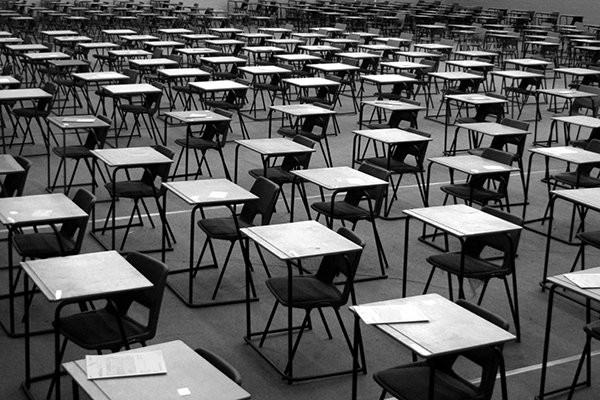This summer’s grades and exams fiasco has brought into sharp focus the question of what exams are for.
It’s time to ask whether they really benefit young people.
Why are we talking about exams?
Exams were cancelled this year due to Covid-19. An algorithm was used to calculate grades. But the results produced by this algorithm reinforced class biases in education.
Students in schools in disadvantaged areas were marked down, while results of students at independent schools were increased. The biggest losers were high achieving students at poorly performing schools or disadvantaged areas.
Following public outcry, the government performed a u-turn and went back to using the grades based on by a teacher assessment process.
What’s going to happen to exams in 2021?
Young people taking exams next year were quick to point out their year would also be severely affected by Covid.
The Department for Education is determined that exams should go ahead in England. In response to concerns about lost learning, they announced a 3-week delay for some GCSEs and A-Level exams. Students have lost 3 months of teaching and learning. Many headteachers believe the 3-week delay will only result in ‘marginal gains’.
And, of course, there is the very real prospect of more disruption this year. One in 6 secondary schools have sent students home due to Covid. And the unequal regional impact of Covid could, like the exam algorithm, make inequalities worst.
(In Scotland, National 5 exams will be replaced next year by teacher assessments and coursework. Higher exams will take place later than usual. There has not been an announcement about Wales yet.)
4 problems with GCSEs
So GCSEs are under more scrutiny than ever before.
It’s a tough time for schools across the country. It’s also the right time to talk about some of the more fundamental problems with GCSEs
1. We’re setting up a third of students to fail
When GCSEs replaced ‘O’ Levels and CSEs in 1986, they were designed to test knowledge of the curriculum (a ‘criterion referenced exam’) and sit alongside teacher-assessed coursework. Things have changed from their original purpose.
Many are now 100% exams. And those exams are now ‘norm referenced’ – comparing students to national average, not just how much they know. Essentially, looking to create a ranking, not just test knowledge.
A system based fully on testing the curriculum could see 100% pass. In the current ‘norm reference’ system, this is impossible. No matter how well students do some by definition must fail.
This means that every year about 30% of students will have been deemed to have failed, having not achieved at least a grade 4 GCSE in the core subjects of English and maths. (Grade 4 is roughly the same as a C grade in the old letter based system.) This is the ‘forgotten third’.
It is cruel to hear the language of ‘levelling up’ and ‘improving standards’ when the exam system cannot allow improvement to happen. If teachers and schools help pupils understand the curriculum better, then the goalposts shift.
It was this system that was exposed this summer. The algorithm required teachers to rank students. Learning became a zero-sum game. But that process is already hard-wired into our education system.
2. Marking is not accurate
Marking exam papers is not an exact science. Objective questions, like multiple choice, have a definitive mark. Subjective questions, like essays, cannot have a certain answer. Markers will inevitably disagree.
Exams "are reliable to one grade either way". That’s what Dame Glenys Stacey, acting head of Ofqual, told the Commons Education Select Committee recently.
On this basis if you got a grade 4 at GCSE it could equally have been a 3 or a 5. That margin of error makes a huge difference in people’s lives.
3. GCSEs are at the heart of pressure on schools
GCSEs are central to how schools are judged. This is part of the accountability system known as Progress 8 measures. The government remains wedded to this concept, despite how much it’s been disrupted this year.
The pressure for schools to get good GCSE marks is as bad as it is for students. And it’s hurting young people.
The practice of ‘off-rolling’ - removing of students from school before GCSE exams so they do not negatively impact on the school’s overall results or league table position, is now well documented.
Our research found that ‘accountability measures have unintentionally incentivised some schools to resort to unethical practices such as off-rolling students.’
This practice entrenches inequality. Young people from disadvantaged groups are being disproportionately excluded from school: Black Caribbean students are excluded at a rate of nearly three times their White British peers.
Changing GCSEs would mean changing the school accountability system. That would require real leadership.
4. GCSEs forces students to narrow their options too soon
The current GCSE system forces students to choose subjects to study at age 13 or 14. Is that still appropriate? Their options are weighted towards academic choices. The lack of vocational options reduces choice and the feeling of control.
Schools are under pressure to offer the English Baccalaureate (EBacc). This ‘core academic’ route further reduces student’s options. (The government aims for 90% of students to study the EBacc by 2025.)
In the best-performing countries, subject specialisation happens at age 16, not 13-14. And in many, graduation is based on a combination of evidence, not just exam results.
Young people are now required to stay in education or training until they are 18. They have more time than when GCSEs began to enjoy and explore a range of subjects.
Instead, we have “constructed a system where a set of tests, taken over a couple of weeks, are the gateway to many of life’s choices”.
Can we really change GCSEs?
These are the problems with GCSEs. But is change realistic?
School leaders are starting to speak out:
- The largest teaching union (the National Education Union) are petitioning for systemic change to the GCSE and A Level assessment and the awarding process. The campaign has now gained over 45,000 signatures amongst their members.
- Stephen Tierney, Multi-Academy Trust CEO and author, claims that GCSEs are now serving too many masters and offers a helpful analysis of the issues.
- Colin Hopkins, Executive Director of RSA Academies, argues that GCSEs are harming creativity and collaboration across the whole of our education system.
- Former teacher and journalist Laura McInerney says the system is broken.
- Kenneth Baker, who was Education Secretary when GCSEs were introduced, has joined the call to reform them. He has joined a coalition of state and private schools calling for change in the current system.
A groundswell is growing. And there are other ways.
The UK is outlier in the global rankings of school results (PISA) as the only country using external assessments for exams. For example, in Finland at the end of compulsory education at age 16 students decide on an academic or vocational path. There’s no formal test to decide – it’s their decision.
But will the Department for Education listen to this growing change of opinion?
This year’s exam fiasco has exposed the faults of the current system. Are we brave enough to take the opportunity to do things differently?
Related articles
-
How to be an anti-racist educator
Blog
Laura Partridge
Reflecting, thinking long-term, and fixing what’s wrong with our schools.
-
More A-level results style disasters await until we tame the algorithm
Blog
Anthony Painter
Algorithms aren't fair.
-
The impact of exam changes on students explained
Blog
Hannah Breeze
The Government promised no child would be disadvantaged by the pandemic. Exams changes put this at risk.



